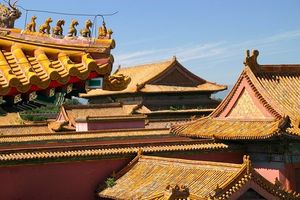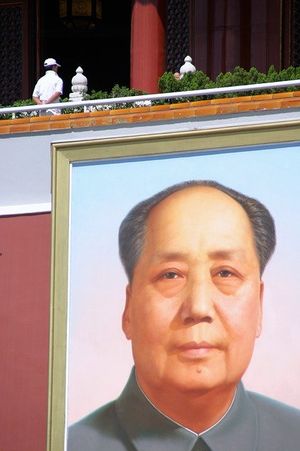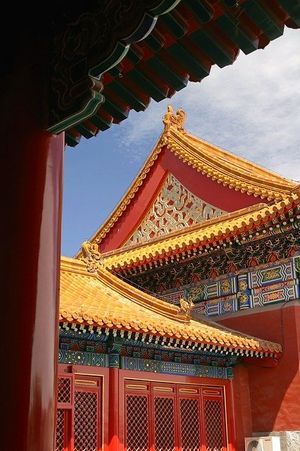Wang Ming-Zi, the iron man of China, was dug from tough terrain. Was Wun-I, Wang’s mother, a Christian? Fiery in temperament and suspicious by nature, she certainly was not a docile young woman.
But on that hot summer’s day in Peking (Beijing) in June 1900, Wun-I had no option but to follow her husband meekly into the Legation Quarter of the city. Nominal Christians mingled with true converts to Christ, and together with foreigners they fled into the safety of its confines. The staff of the Methodist Missionary Hospital where Wun-I’s husband, Dr Wong Dzu Hou, worked were among that crowd. Wun-I herself moved with difficulty for it was not long before her baby was to be born. Her companions hurried her along. A price was on their heads.
Plight of the masses
In the nineteenth century many Chinese reformers had embraced Christianity, their motive being to save China. Once a proud leader in world commerce, China had fallen behind. Weakened by its defeat by Britain in the Opium Wars half a century before, and lacking a strong unified central government, China had been unable to halt foreign aggression and encroachment. China’s modernisation was being hindered by Confucian ideologies and the opposition to change of the Manchu Qing dynasty. The reformers attributed the secret of the West’s power to its religion, its democracy and its industry. They determined on emulation.
Meanwhile, in the long hot summer of 1900, and after three years of drought and famine, the plight of the masses had reached breaking point. They saw things differently from the reformers. Frustrated with Western control, many anti-Western societies had sprung up. The people’s desperation surfaced in the uprising of a particularly popular superstitious peasant society, the ‘Society of the Harmonious Fist’. They were commonly known as ‘the Boxers’.
The Boxers placed the blame for China’s predicament on the collusion of Chinese Christians with the foreigners. The railways the Westerners had built had cut through their sacred burying grounds and the Boxer placards blazoned forth: ‘They have destroyed Buddhist images and seized our people’s graveyards. This has angered Heaven’.
The Qing-dynasty government made a half-hearted attempt to suppress the movement. This further infuriated the Boxers. Their war-cry rang out, ‘Overthrow the Qing, wipe out the foreigners’.
Reward for blood
In her consternation, the Empress Dowager consulted the Manchu princes. But already some of them had lent their ears to the Boxers. Intent on the preservation of the dynasty, the Empress said, ‘China is weak; the only thing we can rely on is the hearts of our people’. She would offer rewards to the Boxers, she decided, for the blood of foreigners and Christians. Her ploy was successful. The Boxer slogan changed. Now they would support the dynasty!
Inside the Legation Quarter, the occupants trembled. Outside, the Qing troops and Boxers joined forces, firing into the safety zone. The West declared war on China and allied forces began to arrive. The streets of the beautiful city of Peking were in chaos. And within the compound some hearts failed. Tragically, and almost immediately, Wun-I’s husband advised and chose suicide. This time Wun-I did not follow him. One month later, in the middle of an eight-week siege and almost incessant rifle fire, a fine strong baby boy was born. They called him ‘the iron child’ and named him ‘Wang Ming-Zi’ (iron).
Little Wang would not always be strong, but he was one of that great number who ‘out of weakness were made strong’ (Hebrews 11:34). He would become ‘an iron pillar against which the whole land would not prevail’ (Jeremiah 1:18-19). Like his reforming countrymen before him, he would desire the salvation of China. But, unlike them, his confidence would be in the gospel of Jesus Christ. He would be a Chinese reformer at the highest level, that is, in the Christian Church.
A time of preparation
The West suppressed the violence and Wun-I was released to eke out a meagre existence with the proceeds from her indemnity money. Often there was only one meal a day for Wang and his older sister. The black-haired, poverty-stricken boy was a familiar sight around the waste bins of the city. ‘For many years’, Wang says, ‘I collected rubbish to take home to make a fire’.
As Wang’s body weakened, his mind strengthened. Deeply observant, he saw the struggles of his nation continue as resistance to foreign influence rumbled on. He watched and thought while the dynasties crumbled and long centuries of culture gave way. He mused over the existential problems of humanity. Above all, he longed for immortality. The seed-bed of Wang Ming-Zi’s life’s work was being prepared.
At school Wang excelled. And among the boys he displayed moral courage. But he had lived alongside depraved people. Disillusioned about the transience of life and without a leader, he was confused. And he says, ‘I was like the pupils around me, wilful, indulging in evil thoughts and bad language’.
The school Wang attended was established by the London Mission. He seemed to gain little from it spiritually because it lacked vital teaching. Other unfortunate experiences with missionaries would affect his later attitude to foreign missions. But one boy at school attracted Wang’s attention. He seemed to genuinely care about his fellow students. Wang was impressed.
Sought out
One day the boy sought Wang out. ‘I want to talk to you about God … about a personal relationship with deity’, he said. He went on to speak about life and death and eternal life. In faraway Jerusalem nearly 2000 years ago, he told Wang, God had provided a way of salvation for sinners. Eternal life was made possible through the sacrifice of Jesus Christ. He lived and died and rose again that we might live. Wang listened and a work of conversion to God began in the fourteen-year-old. He records in his diary: ‘From that day on I had a purpose in life’.
So there was hope! The sinful, quarrelling people who lived around the courtyard at home, his fellow pupils too, could be changed. Minds could be renewed! Wang himself changed, although he did not understand it at the time. He felt shame for his own sins and longed for purity.
Soon afterwards, his young friend gave Wang a little book. He remembered it was edited by H. L. Zia. That book would indelibly imprint upon his mind the importance of the practical life of the Christian. It was to colour his lifelong ministry.
As the months passed Wang Ming-Zi’s desire for integrity deepened. Within him the conflict between good and evil intensified. There were setbacks but the youth began to grow spiritually. And as China’s unrest advanced, Wang’s inner calm increased. He grew nearer to the One who said, ‘Come unto me all you that labour and are heavy laden and I will give you rest’.
God’s call to preach
Nevertheless the deep-thinking lad cringed at the nation’s diplomatic miscalculations. To embark on a political career, he felt, would be his contribution to help China. ‘On my breast’, he wrote, ‘I wore the slogan “Human determination will decide destiny”.’ Wang Ming-Zi still had lessons to learn.
Before long, an uncomfortable feeling arose in the boy’s consciousness. He sensed that God was calling him into his service. But he was reluctant to admit to it. He was becoming conscious of his abilities and it was China he wanted to serve. For some years a struggle went on in the teenager. Then, at the all-important Chinese examinations, Wang went down with a serious illness. In his strength, Wang Ming-Zi had tried to resist God’s call; in his weakness he submitted.
Ming-Zi was blessed when a teaching post became available for him in a Presbyterian school in Baoding. When lessons were over he used to gather the pupils together and seek to nurture their minds with the truth of Scripture. When the young man saw fruit appearing from his labours, he realised that God’s call to preach was a work of surpassing importance.
A revolution needed
Another reason to devote his life to the work of God now presented itself to him. He began to be aware that the darkness and corruption of the world was mirrored in the Chinese Church. A revolution was needed. He must work to this end.
In 1920 Wang Ming-Zi formally changed the name he had never liked to Ming Dao, signifying, ‘May God use me in a world of darkness and depravity to testify to his truth’.
But Wang Ming Dao was not yet fit for that, though by this time he was living a diligent Christian life. Afterwards he would confess, ‘I considered myself greatly superior to other believers’. With the total honesty for which he later became known, Wang says, ‘I felt that there were not many of my calibre [in the church] with ideals like mine’.
Some of his fellow tutors resented Ming Dao’s dedication. One day a new colleague happened to observe, ‘Some believers work industriously … not to glorify God but to glorify themselves’. The shaft went home, and when Wang Ming Dao’s anger subsided that remark became one among the ‘all things that work together for good to those who love God’.
Wonderfully changed
Wang Ming Dao admitted his colleague’s statement applied to him. On his knees he feared and trembled before God. ‘I knew myself to be vicious, unclean and hateful. I realised’, he says, ‘the blood of Christ to be my only hope of entering the presence of God. I dedicated myself to him anew. I was ready to serve Him faithfully all my life long’.
Even so, Wang Ming Dao’s training was not complete. Much teaching was still to take place but the Lord’s servant knew himself to be wonderfully changed. And in spite of his change of name, Wang Ming Dao would indeed become a pillar of iron in the Chinese Church. But first he must feel the heat of the fire of persecution.
















